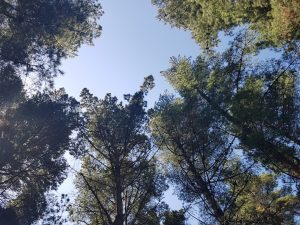Leading the Troops
Good leaders are hard to find. The type that other people want to follow that is. With a fair bit of digital noise, millennial attitudes and various cross pollinating ideologies in existence, a buzzword that is on trend right now is the term ‘Impact’.
As a result many leaders today are asking not just how to impact and lead teams but what they need to do to impact the community or are now looking at impacts at a global scale?
‘Doing big things in business’ or even getting the team started on a small project all start and require the same fundamentals of Leadership: Influencing others and Building Cohesive Teams.
Do it – “For the Country!”
This week we had the chance to set our own entrepreneurial and leadership lives aside and speak to someone whose leadership duties are, we can say on somewhat bigger scale. We met up with a serving Lieutenant, of the Royal Australian Artillery and had a great indepth interview with him about the life of an Leader in the Australian Army Reserves.
While the rest of us are worrying about burning the midnight oil again, one night each week the Lieutenant, is leading an Army Leadership training night.
On this night the Lieutenant, heads out the door to lead a troop of 40 soldiers.
Each week he returns home knowing that the team is going well, he’s done his very best in training them & that he has set up the game play/battle play for the week; with the country’s shores in mind.

Running an Army
So, let’s for a few minutes imagine ourselves leading at a bigger scale beyond our small businesses or a just a different landscape. Imagine yourself running an Army.
How and where on earth would we start?
Surprisingly when we spoke to the Lieutenant, two key fundamentals were obvious in for “being the boss” over at the Army: Influence and Team Collaboration. Otherwise known in the Army as “Command Prescence” and “Resilient Teams”.
2 Key Fundamentals:
LEADERSHIP
Influence & Command Presence
Be Clear in your Information and Instruction
RESILIENCE
Courage & Making Decisions
Sticking together & Collaboration as Teams
Being Agile (Flexible)
Training to prepare
Leaders Lead, Followers Follow
These are some of the insights we gained from our chat with the Lieutenant.
Leadership requires Strong Influence
- The term Leadership is actually defines itself, as “the art of influencing others to willingly achieve your goals”
- Leaders are not those who force followers into their dogma, but who invite followers to join their journey. You will need to ensure you work out the principles of getting your people to follow you on your journey
Command Presence
- Command Presence means how to speak with conviction and convince others to know what you’re talking about!
- The Army calls this conviction and ‘convincability’ as “Command presence”. It’s the ability to enter a room and have people know that you’re in charge, and what you say is worth listening too. It doesn’t mean being louder or stronger, it means being aware of your audience and understanding what you want to get out of them (and what they want of you)
Be Clear in your Information and Instruction
- The Army’s method of sharing information (strict and procedural), coupled with its style of delivery (confidently and with purpose) has allowed me to influence those around me to a great degree. It’s often not noticed, and isn’t a problem (remember: willingly) but it’s certainly not an accident from my end
- I understand that can sound a bit manipulative, but it’s not that crazy an idea – most of us attempt this in our daily lives, from trying to get a better airplane seat to what TV we should watch. But I think the Army gives you an edge.
Sticking together & Collaboration as Teams
- The strongest friends are made by going through tough times together.
Adaptable, Agile, Flexible Leadership
- Companies are already so diverse in their purposes and goals, it’s hard to say that ‘companies’ need to change. As long as companies remain adaptable and relevant (easier said than done).
Training to prepare
- Training is the only thing you can do to further prepare yourself. For example, whilst it has no application to combat the army conducts adventure training (abseiling off cliffs etc) to teach you your own response to extreme fear. Once you know this response, you can manage it and reduce it. Take away: be a better decision maker under pressure by abseiling off cliffs.
Courage & Making Decisions
- Talking of resilience, I’d like to mention that it doesn’t mean blind fortitude. Even the army won’t continue down a bad road – you need the courage to turn around, even if it means abandoning sunk costs. Make wise decisions, it’s a hard line between sticking to goals vs sticking to goals.
Leaders Lead, Followers Follow
- Followers will continue (mentally) indefinitely until their leader stops. If a leader stops (i.e. gives up), he is no longer the leader. Leaders cannot be seen to give up, or they’re simply will cease to have followers.
Focus Now Reflection:
Surprisingly or not so, the biggest insight was that leadership is derived from the very basic levels of humanity – “Human connection”. Connecting with others in the team at a level of personal friendship level was key; because at the ‘edge of survival’ this is when the complex decisions need to be made, camaraderie needs to run deep, and already be well practiced and enforced, so the team knows exactly which direction to go instinctively when ‘the going gets tough’. They need to stick together, not just for the team’s sake, nor ‘the business’ but the outcome, ‘the safety and running of the country’.

Focus Now leadership assessment:
- How well do we lead our teams?
- How do we define our leadership styles? Do we have different styles? Are there leadership checklists we can use to help us navigate and support our teams through?
-
Do we constantly assess the business landscape and working out what our team needs at any given time? How can we do this more efficiently?
-
Do we have the capabilities and skills we need to lead our teams, make decisions, know when to start stop and remain agile and resilient while creating an impact?
Focus Now leadership thoughts:
There’s a lot to consider when leading but focusing on a few outcomes at a time (i.e. what really matters for the team) in order for them to be as cohesive and resilient as possible, is a practice that we could lead our teams to expect from themselves at the start.
Having a strong command presence and impact with our teams to see them take action with little nagging and with the right amount of leading and guidance is a goal we may choose to strive for.
By the end of our interview with Lieutenant, it was obvious how proud of his troops no matter what challenges they faced and it was evident in the repeated words of ‘taking care’ of his troops, that this was a supporting and caring leadership style that made all the difference. That same tone of pride rubbed off on us and left us feeling as honoured as we were to have the opportunity to interview a Lieutenant from the Australian Army Reserves for such an insight. We were sure the troops feel equally as proud to be part of the overall goals set for them and be part of a resilient, cohesive comrade ‘serving selflessly’ as they do.
*due to the privacy and respect for the Australian Army Reserves guidelines and it’s serving members, the Lieutenant remains unnamed, however we were honoured to have the opportunity and give credit to the Lieutenant for contributing to this above interview.

